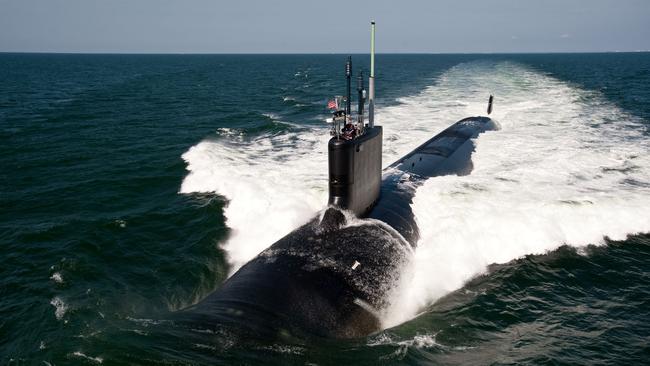Virginia sub budget plea stokes AUKUS fears
The White House has made an emergency funding request to congress to shore up Virginia-class submarine production, stoking doubts the US will have enough boats to meet its AUKUS pledge.

The White House has issued an emergency funding request to congress to shore up the troubled Virginia-class submarine program, stoking doubts the US will have enough boats to meet its AUKUS pledge to Australia.
The $US5.7bn ($8.8bn) request comes as the US submarine industry continues to undershoot Virginia-class production targets, turning out an average of 1.3 boats a year - well short of the 2.33 a year it needs to provide three to Australia in the 2030s.
“Our Virginia-class fast attack submarine program is not where it needs to be right now,” a senior US Navy official told media outlet Breaking Defence.
“The program and the shipyards are not producing submarines at the rate our national security strategy and the national defence strategy require.”
The funding request this week from the White House’s Office of Management and Budget was to meet shortfalls for two submarines this year and one in 2025.
It follows an Albanese government pledge to sink $US3bn ($4.62bn) into the US industrial base to bolster submarine production. The US Navy needs to be producing at least two boats a year for its own needs and an extra one boat every three years to meet its AUKUS commitment to deliver Virginia-class submarines to Australia in 2032, 2035 and 2038.
Each boat takes about nine years to produce from the awarding of a contract to delivery.
The latest funding request comes amid uncertainty in Canberra and Washington over Donald Trump’s views of AUKUS, and whether the incoming president will seek to renegotiate the deal.
Strategic Analysis Australia research director Marcus Hellyer said the latest US Navy forecasts showed the US submarine production schedule was unchanged since the AUKUS plan was first announced.
“We’re now three years into AUKUS and there will be no more boats in existence by 2032, when we’re meant to be getting one, than there was under the pre-AUKUS plan,” Dr Hellyer told The Australian.
He said because of long lead times involved, US efforts to improve the submarine supply chain would not have any real impact on production for at least another decade. “Certainly, into the mid-2030s, any submarine that is handed over to Australia will be a net loss to the US Navy,” Dr Hellyer said.
Under AUKUS enabling legislation passed by the US congress, a future US president will have to certify that the transfer of nuclear submarines to Australia “will not degrade the US undersea capabilities” and is “consistent with US foreign policy and national security interests”.
The sale will also be conditional on the US “making sufficient submarine production and maintenance investments” to meet its own needs, and on Australia having the capability to operate the vessels.
The Australian Submarine Agency welcomed the Biden administration’s November 25 request for congress to free up extra funds for submarine production.
“This request demonstrates the bipartisan commitment in the US to uplifting its industrial base, a critical enabler for delivering AUKUS,” an ASA spokesman said. “Since the announcement of the AUKUS pathway in March 2023, the US administration and US congress have taken many steps to increase investment in the US submarine industrial base.
“Australia’s $US3bn contribution to the US submarine industrial base will complement US investments.”
Mr Trump’s former National Security Agency head, Admiral Mike Rogers, told The Australian earlier this month that Australia needed to be prepared to argue its case but he believed the president-elect would back the agreement when he saw its value to the US.
Former Coalition prime minister Scott Morrison, who sealed the trilateral AUKUS deal with Joe Biden and then-British prime minister Boris Johnson, raised the importance of the pact for Australia during a meeting with Mr Trump in May. “I discussed how the AUKUS agreement played a critical role, which I was pleased was a view shared by former president Trump,” he said at the time.
“There was a welcome level of comfort about AUKUS in our discussion.”




To join the conversation, please log in. Don't have an account? Register
Join the conversation, you are commenting as Logout